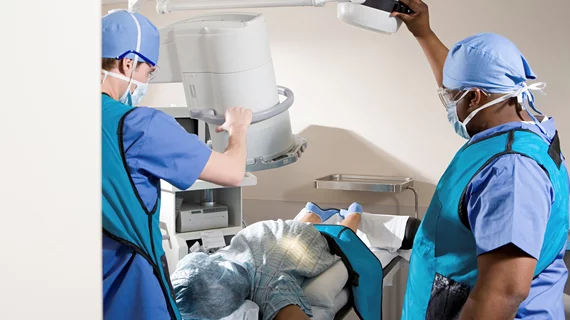Less work, more stress—how interventional radiology departments felt the impact of COVID
Survey results published recently in CardioVascular and Interventional Radiology paint a picture of how interventional radiologists across the world felt the impact of COVID from both a clinical and personal perspective.
When many elective interventional procedures were put on pause to stop the spread of the virus in the spring of 2020, interventional radiology exams were reported to have dropped by 16-62%. As the second wave emerged, departments and providers did not consider the prolonged postponements to be sustainable, despite the increased risks to patients and staff.
“The risk of recurrence and gravity of further waves, combined with mounting pressures secondary to postponed procedures, particularly in the cancer care setting, has led to worldwide concern and highlighted the need for robust service recovery plans,” corresponding author B. Zeka, with the clinical research department of the Cardiovascular and Interventional Radiological Society of Europe, and co-authors wrote.
After the second COVID wave hit healthcare systems, researchers developed a six-part survey to gauge the impact the pandemic had on interventional radiology departments. Though interventional procedures got back on track, the results of the study suggest that this process was not without consequences.
Out of 450 respondents, 18% reported a notable reduction in workloads and 36% detailed mild decreases, with elective embolization being the most postponed procedure. Research activities were also delayed across the board by an average of 30%.
Despite the workload reduction, high levels of stress pertaining to the safety and wellbeing of patients and families were disclosed by many questionnaire participants, with 29% disclosing they felt the impact significantly. Many admitted feeling frustrated with the lack of PPE and preparedness during the first wave of COVID, but 59% of those most recently surveyed felt that their organization is better prepared for future outbreaks and up to 39% reported that changes made due to COVID will be implemented long-term.
“It became apparent that long-term adaptations and implementation of routes to provide services safely rather than repeatedly postponing non-urgent care, as well as monitoring the burden on the mental health of IRs and IR service staff, were necessary,” the experts said.
As normal services are restored, the authors suggest there will be a backlog of procedures that were postponed, which could result in burdensome workloads. They cautioned that this could further impact the mental health and wellbeing of interventional staff and should be monitored closely.
More interventional radiology content:
Interventional radiologists and residents highlight optimal features of IR training programs
Mentorship 'crucial' for interventional radiologist trainees to overcome research obstacles
Nearly one-third of interventional radiologists aren’t formally discussing adverse events

